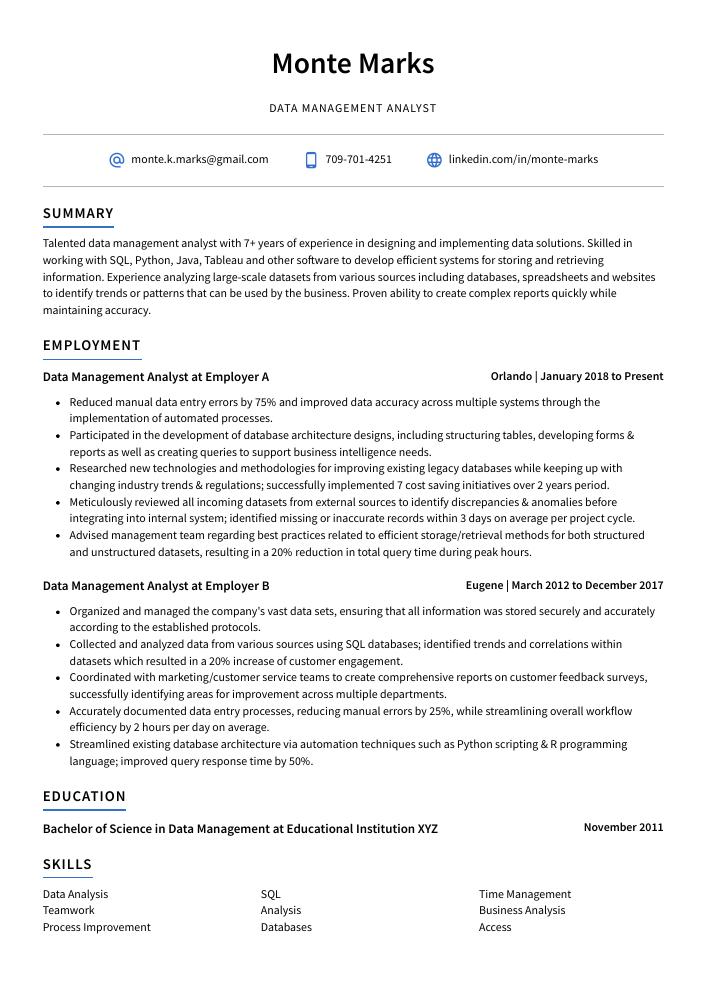Data Management Analyst Resume Guide
Data management analysts analyze and organize data to help businesses make informed decisions. They use tools like databases, spreadsheets, and software programs to store, manipulate, visualize, and report on data sets. Additionally, they identify areas where improvements can be made in the organization’s existing processes for collecting or handling data.
Data management is your forte, yet employers don’t know about it. To let them in on your expertise, you must write a resume that highlights all of the data-related accomplishments and skills you have to offer.
This guide will walk you through the entire process of creating a top-notch resume. We first show you a complete example and then break down what each resume section should look like.
Table of Contents
The guide is divided into sections for your convenience. You can read it from beginning to end or use the table of contents below to jump to a specific part.
Data Management Analyst Resume Sample
Monte Marks
Data Management Analyst
[email protected]
709-701-4251
linkedin.com/in/monte-marks
Summary
Talented data management analyst with 7+ years of experience in designing and implementing data solutions. Skilled in working with SQL, Python, Java, Tableau and other software to develop efficient systems for storing and retrieving information. Experience analyzing large-scale datasets from various sources including databases, spreadsheets and websites to identify trends or patterns that can be used by the business. Proven ability to create complex reports quickly while maintaining accuracy.
Experience
Data Management Analyst, Employer A
Orlando, Jan 2018 – Present
- Reduced manual data entry errors by 75% and improved data accuracy across multiple systems through the implementation of automated processes.
- Participated in the development of database architecture designs, including structuring tables, developing forms & reports as well as creating queries to support business intelligence needs.
- Researched new technologies and methodologies for improving existing legacy databases while keeping up with changing industry trends & regulations; successfully implemented 7 cost saving initiatives over 2 years period.
- Meticulously reviewed all incoming datasets from external sources to identify discrepancies & anomalies before integrating into internal system; identified missing or inaccurate records within 3 days on average per project cycle.
- Advised management team regarding best practices related to efficient storage/retrieval methods for both structured and unstructured datasets, resulting in a 20% reduction in total query time during peak hours.
Data Management Analyst, Employer B
Eugene, Mar 2012 – Dec 2017
- Organized and managed the company’s vast data sets, ensuring that all information was stored securely and accurately according to the established protocols.
- Collected and analyzed data from various sources using SQL databases; identified trends and correlations within datasets which resulted in a 20% increase of customer engagement.
- Coordinated with marketing/customer service teams to create comprehensive reports on customer feedback surveys, successfully identifying areas for improvement across multiple departments.
- Accurately documented data entry processes, reducing manual errors by 25%, while streamlining overall workflow efficiency by 2 hours per day on average.
- Streamlined existing database architecture via automation techniques such as Python scripting & R programming language; improved query response time by 50%.
Skills
- Data Analysis
- SQL
- Time Management
- Teamwork
- Analysis
- Business Analysis
- Process Improvement
- Databases
- Access
Education
Bachelor of Science in Data Management
Educational Institution XYZ
Nov 2011
Certifications
Certified Data Management Professional
Data Management Association International
May 2017
1. Summary / Objective
Your resume summary should provide the hiring manager with a snapshot of your experience and qualifications as a data management analyst. You can use this section to highlight key skills such as database design, data mining, analytics software proficiency, and project management. You could also mention any certifications you have obtained or awards you have won for exceptional performance in past roles.
Below are some resume summary examples:
Amicable data management analyst with 8+ years of experience in data analysis and database administration. Adept at collecting, organizing, and analyzing large amounts of data to identify trends and inform strategic decision-making. At XYZ Corporation, led the successful implementation of a new enterprise Data Warehouse system that increased operational efficiency by 25%. Experienced in developing custom analytical reports for C-level executives across multiple industries.
Hard-working and detail-oriented data management analyst with 8+ years of experience in developing and implementing end-to-end solutions for collecting, storing, analyzing, and reporting on large volumes of business data. At XYZ, managed the development and implementation of a new enterprise wide data warehouse that streamlined processes across multiple departments. Experienced in using SQL to design databases as well as creating dashboards for business intelligence.
Passionate data management analyst with 8+ years of experience managing and analyzing large-scale data sets. Expert in developing efficient solutions to solve complex business problems. At XYZ, led a team responsible for the successful implementation of an enterprise data warehouse system that resulted in improved operational efficiencies by 20%. Experienced at using SQL and visualizing tools like Tableau to generate meaningful insights from datasets.
Detail-oriented Data Management Analyst with 5+ years of experience managing and analyzing large datasets. Proven ability to develop innovative solutions that improve data accuracy, drive efficiency, and maximize cost savings across the organization. Experienced in using SQL Server to create databases for business intelligence reporting. Seeking a role at ABC Technologies where I can use my skillset to help achieve organizational goals.
Diligent data management analyst with 5+ years of experience in the development, maintenance and analysis of data systems. Seeking to join ABC as a Data Management Analyst where I can utilize my knowledge of database design principles, SQL programming and report writing to help improve organizational efficiency. Achieved 20% improvement in accuracy for financial reports by streamlining processes for client accounts.
Seasoned data management analyst with 10+ years of experience in analyzing, organizing, and presenting data to stakeholders. Seeking to leverage expertise in developing solutions for business intelligence at ABCTech. At XYZ Inc., developed a database architecture that increased performance by 20%. Also designed an automated reporting system that generated accurate reports within 15 minutes instead of 2 hours.
Professional data management analyst with 5+ years of experience in designing and developing complex databases from scratch. Experienced in overseeing data governance processes, maintaining accuracy, and analyzing large-scale datasets for business insights. Looking to join ABC Tech to leverage advanced database skills and ensure that the company’s system architecture is up-to-date and secure.
Skilled data management analyst with 5+ years of experience in analyzing, designing and managing databases. Proven track record of optimizing operations through efficient data analysis processes and recommending corrective actions to improve performance. Seeking a challenging role at ABC that will utilize my knowledge in database administration, ETL development and problem-solving skills.
2. Experience / Employment
In the experience section, you should list your work history in reverse chronological order. This means that the most recent job is listed first.
When writing out what you did at each job, use bullet points to make it easier for the reader to take in all of the information quickly and easily. You want to provide detail on what tasks were completed and any quantifiable results achieved as a result of those tasks.
For example, instead of saying “Organized data,” you could say, “Developed an automated system for organizing customer records which resulted in a 40% reduction in manual labor hours.”
To write effective bullet points, begin with a strong verb or adverb. Industry specific verbs to use are:
- Analyzed
- Collected
- Processed
- Managed
- Organized
- Monitored
- Assessed
- Developed
- Implemented
- Automated
- Updated
- Reconciled
- Researched
- Documented
Other general verbs you can use are:
- Achieved
- Advised
- Compiled
- Coordinated
- Demonstrated
- Expedited
- Facilitated
- Formulated
- Improved
- Introduced
- Mentored
- Optimized
- Participated
- Prepared
- Presented
- Reduced
- Reorganized
- Represented
- Revised
- Spearheaded
- Streamlined
- Structured
- Utilized
Below are some example bullet points:
- Analyzed and configured large-scale databases to optimize data management and storage algorithms, resulting in a 14% improvement of system efficiency.
- Resourcefully developed complex SQL queries to retrieve relevant information from disparate sources and join them into meaningful datasets for further analysis; successfully completed over 150 projects.
- Implemented advanced reporting solutions using Power BI, Tableau Desktop & Python programming language that enabled quicker access to key insights across departments; reduced time spent on manual report generation by 30%.
- Spearheaded the development of new backend processes for better organization of customer records and improved customer service experience; achieved an overall 25% reduction in processing time per request.
- Revised existing database architecture designs according to changing business needs in order to improve scalability and flexibility while minimizing costs associated with software licenses or hardware upgrades; saved $10K annually on maintenance expenses alone.
- Thoroughly analyzed multiple databases to identify data discrepancies and inconsistencies, developing proactive solutions that increased data accuracy by 15%.
- Updated database systems with new software and upgrades on a weekly basis; tested system performance against established metrics to ensure quality assurance.
- Monitored real-time changes in the database environment for potential security vulnerabilities, deploying countermeasures that reduced risk by 20%.
- Assessed current methods of storing, managing and organizing data for optimal usage; implemented process improvements that improved efficiency of operations by 10%.
- Mentored junior analysts on best practices within the field of data management such as creating reports & querying databases; trained 8 employees over 2 months resulting in time savings of 25 hours per week collectively across teams.
- Optimized data management process by automating daily tasks and reducing manual work, resulting in a 35% improvement in data accuracy.
- Expedited reporting times by developing an intuitive platform for accessing real-time analytics; decreased report turnaround time from 6 hours to 2 hours on average.
- Developed comprehensive system architecture documentation outlining detailed procedures & processes related to data governance, security & compliance standards; improved team productivity by 20%.
- Utilized advanced techniques such as predictive modeling & machine learning algorithms to identify potential trends in customer behavior and forecast future outcomes with higher precision; increased predictions accuracy rate up to 90%.
- Successfully managed the deployment of new systems across multiple business units while ensuring high levels of quality assurance throughout all stages of development; minimized errors/bugs identified during testing phase by 40%.
- Demonstrated advanced expertise in data analysis, database design and development, and data modeling for a range of clients; increased accuracy of customer records by 20%.
- Reliably maintained the integrity of all client databases using advanced techniques such as normalization, indexing & partitioning to reduce redundancy and improve efficiency.
- Structured complex datasets into user-friendly formats that allowed stakeholders to easily understand insights from their business operations; improved decision making speed by 25%.
- Reorganized company’s internal storage systems with leading industry tools like MongoDB & MySQL while adhering strictly to security protocols; generated cost savings of $20K annually through optimized hardware usage rate.
- Represented management team on various projects related to developing strategies around information lifecycle management (ILM) initiatives which resulted in 10% increase in overall productivity levels across organization.
- Competently analyzed large datasets to identify trends and patterns, resulting in a 20% increase in data accuracy.
- Documented user requirements and created detailed technical specifications for software development teams; improved data access efficiency by 45%.
- Formulated advanced SQL queries to search databases quickly and efficiently; identified discrepancies with current database structures within 3 hours of analysis start-time on average.
- Processed complex business logic into simple algorithms that automated repetitive tasks, reducing manual labor time by 75%.
- Managed the full lifecycle of multiple projects simultaneously, ensuring all deadlines were met while upholding high standards of quality control (+$50K saved).
- Reconciled large datasets of customer information to identify discrepancies, resulting in a 15% reduction in erroneous data entries.
- Independently developed algorithms and scripts to automate data entry processes, reducing manual labor by over 50 hours per week.
- Presented comprehensive analyses detailing trends and patterns among various sales figures to senior management team; identified areas for improvement that saved the company $20K annually.
- Automated report generation procedures using SQL queries and VBA coding techniques which improved accuracy of reports by 70%.
- Compiled monthly financial statements for internal auditing purposes within designated timeframe, improving overall efficiency of accounting operations by 25%.
- Facilitated the migration and consolidation of data from multiple sources into a single, unified system; reduced manual entry errors by 75%.
- Achieved significant time savings for the organization by automating complex report generation processes and streamlining data extraction workflows.
- Actively monitored database performance to identify areas needing improvement; optimized SQL queries resulting in 30% faster loading times on average.
- Prepared comprehensive analytics reports based on gathered business intelligence insights that were used to inform strategic decision-making at all levels of the company.
- Improved workflow efficiency across departments through development of custom software application solutions that saved 35 hours per week collectively within the team’s operations.
3. Skills
The skillset employers require in an employee will likely vary, either slightly or significantly; skimming through their job adverts is the best way to determine what each is looking for. One organization might be looking for someone with experience in data modeling and another might require a candidate proficient in SQL.
It is important to tailor the skills section of your resume to each job you are applying for, as many employers now use applicant tracking systems which scan resumes for certain keywords before passing them on to human recruiters.
In addition, it’s also good practice to elaborate on the most important skills mentioned here by discussing them further in other areas such as the summary or work experience sections.
Below is a list of common skills & terms:
- Access
- Analysis
- Business Analysis
- Business Intelligence
- Business Process Improvement
- Communication
- Customer Satisfaction
- Data Analysis
- Data Entry
- Data Management
- Databases
- Financial Analysis
- HTML
- Healthcare
- Java
- Microsoft SQL Server
- Problem Solving
- Process Improvement
- Program Management
- Python
- Quality Assurance
- R
- Requirements Analysis
- SAS
- SDLC
- SQL
- SharePoint
- Software Documentation
- Tableau
- Team Leadership
- Teamwork
- Time Management
- Troubleshooting
- Visio
- Windows
4. Education
Mentioning your education on a data management analyst resume will depend on how much work experience you have. If you are just starting out and don’t have any professional experience, include your education section below the resume objective. However, if you already have significant work history to showcase, it might be best to omit the education section altogether.
If an education section is included, try to mention courses or subjects related to data analysis that demonstrate your knowledge of this field.
Bachelor of Science in Data Management
Educational Institution XYZ
Nov 2011
5. Certifications
Certifications are a great way to demonstrate your knowledge and proficiency in a certain field. They show potential employers that you have taken the time to hone your skills and stay up-to-date with industry trends.
If you are applying for a job that requires specific certifications, make sure to include them on your resume so hiring managers can see how qualified you are for the position. Additionally, if there is an opportunity to list any professional development courses or other relevant training programs, be sure to add those as well!
Certified Data Management Professional
Data Management Association International
May 2017
6. Contact Info
Your name should be the first thing a reader sees when viewing your resume, so ensure its positioning is prominent. Your phone number should be written in the most commonly used format in your country/city/state, and your email address should be professional.
You can also choose to include a link to your LinkedIn profile, personal website, or other online platforms relevant to your industry.
Finally, name your resume file appropriately to help hiring managers; for Monte Marks, this would be Monte-Marks-resume.pdf or Monte-Marks-resume.docx.
7. Cover Letter
Including a cover letter is an excellent way to make yourself stand out from other job applicants. It is a document that allows you to explain in detail why you are the perfect candidate for the role, and it should include 2-4 paragraphs of information.
Cover letters provide recruiters with more insight into who you are as a professional and offer additional details on your qualifications that can’t be found within your resume. Even if not required, writing one will give you an edge over other candidates applying for the same position.
Below is an example cover letter:
Dear Wilfredo,
I am writing to apply for the Data Management Analyst position at [company name]. With my experience in data entry, analysis, and reporting, as well as my strong organizational skills, I am confident I would be a valuable asset to your team.
In my current role as Data Management Specialist at [company name], I am responsible for maintaining accurate records of customer data and sales information. I regularly prepare reports on our sales performance and trends, which has helped our team make more informed decisions about inventory levels and marketing strategies. In addition, I have developed an efficient system for tracking and managing customer data that has significantly reduced the amount of time our staff spends searching for information.
I believe my skills and experience would benefit your organization in a number of ways:
– Helping you maintain accurate records of customer data and sales information
– Preparing reports on sales performance and trends to inform decision making
– Developing systems to efficiently track and manage customer data
If you are looking for a reliable and detail-oriented analyst who can help you streamline your operations, then please consider me for this role. I will follow up next week to see if there is a good time to meet so we can further discuss the job opening. Thank you for your time!
Sincerely,
Monte
Data Management Analyst Resume Templates
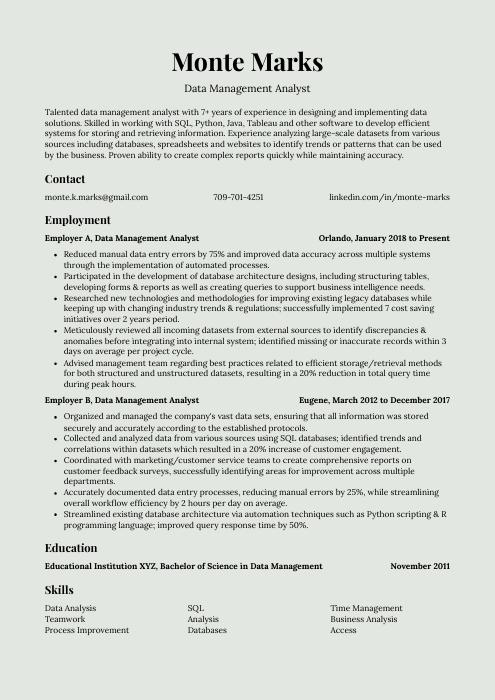 Saola
Saola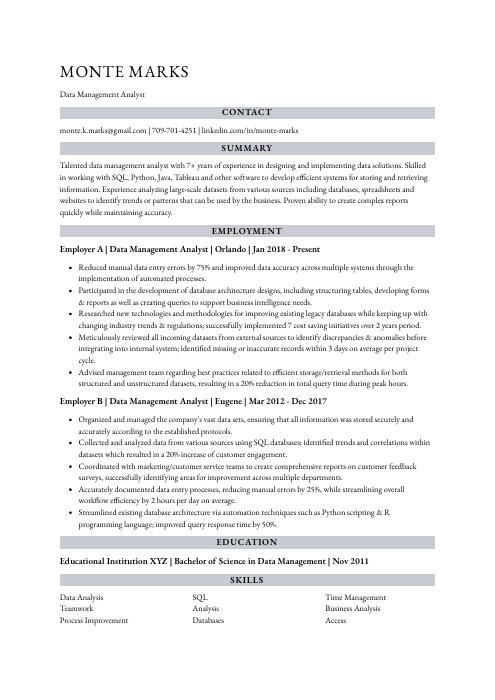 Numbat
Numbat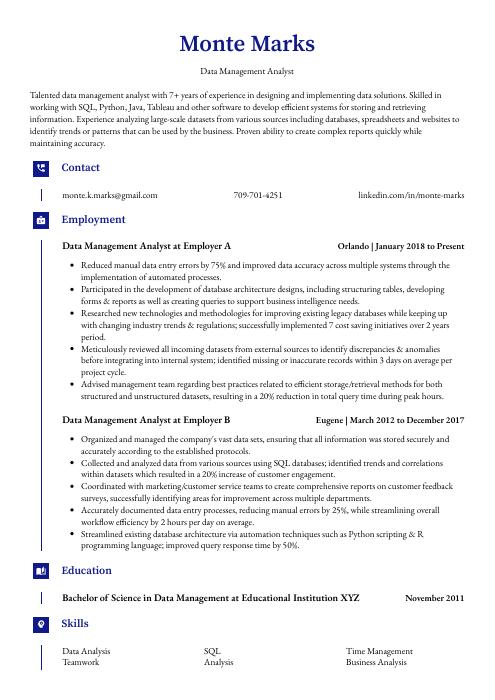 Gharial
Gharial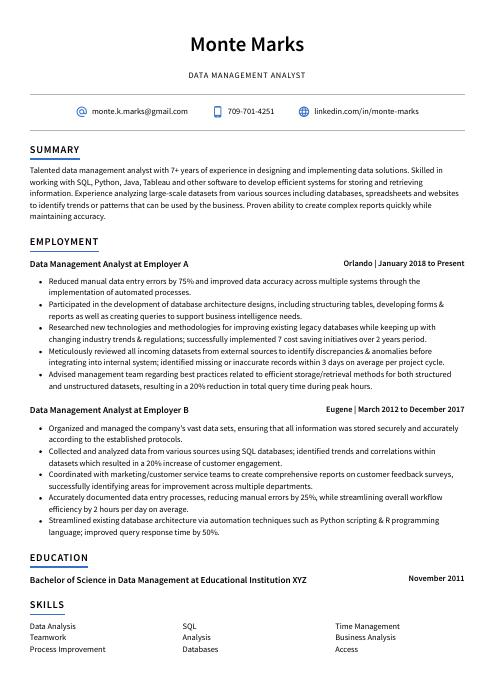 Axolotl
Axolotl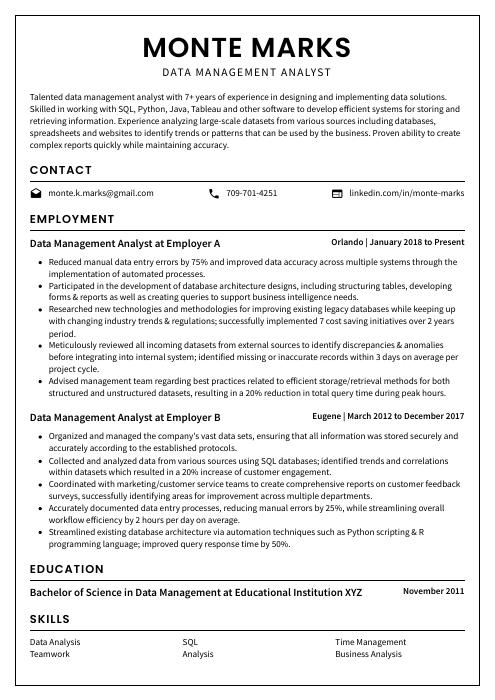 Cormorant
Cormorant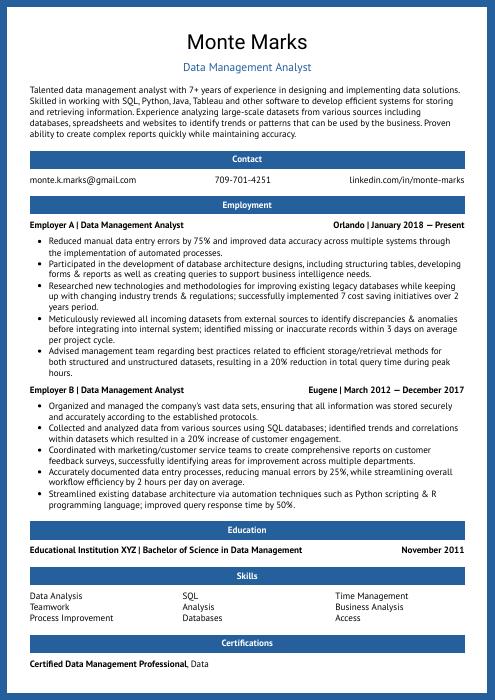 Ocelot
Ocelot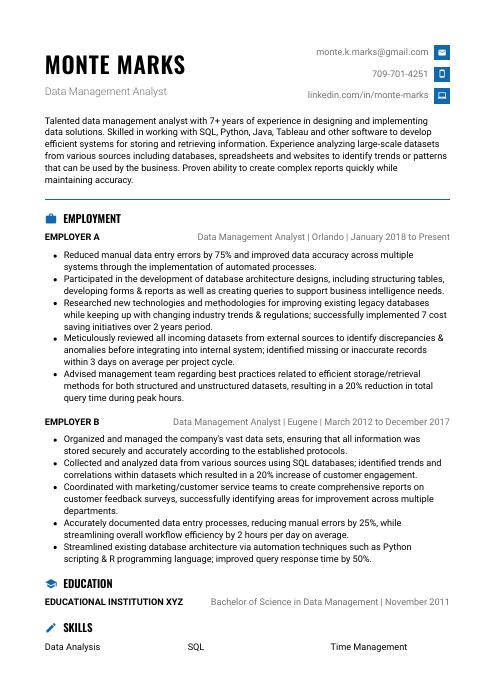 Echidna
Echidna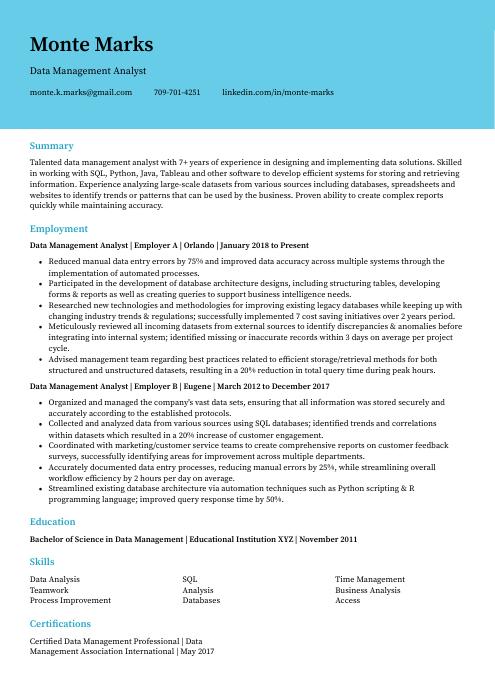 Dugong
Dugong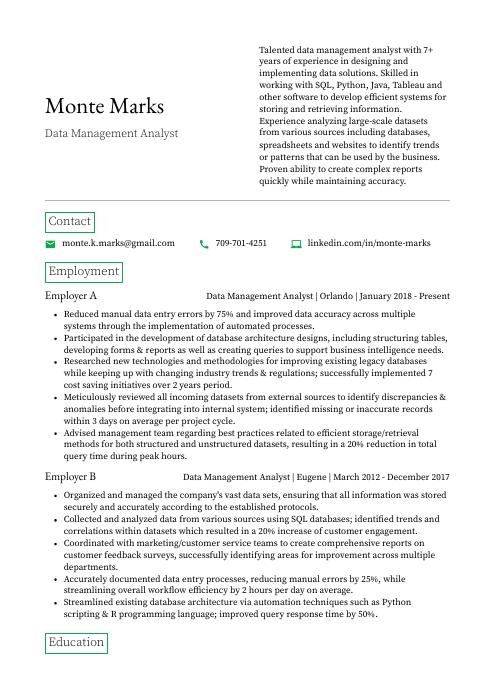 Quokka
Quokka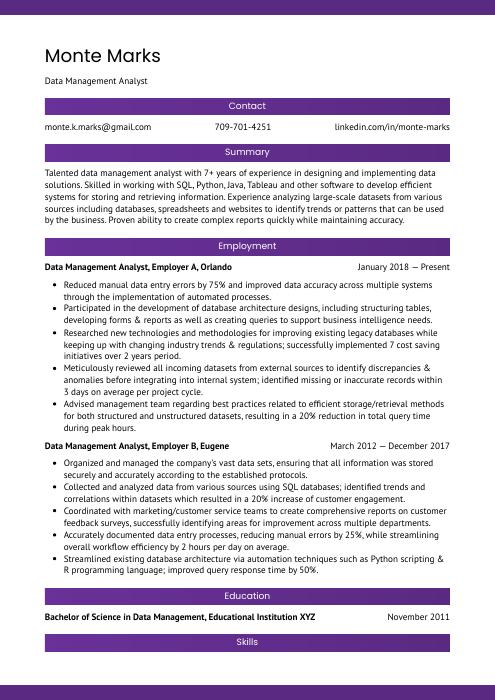 Jerboa
Jerboa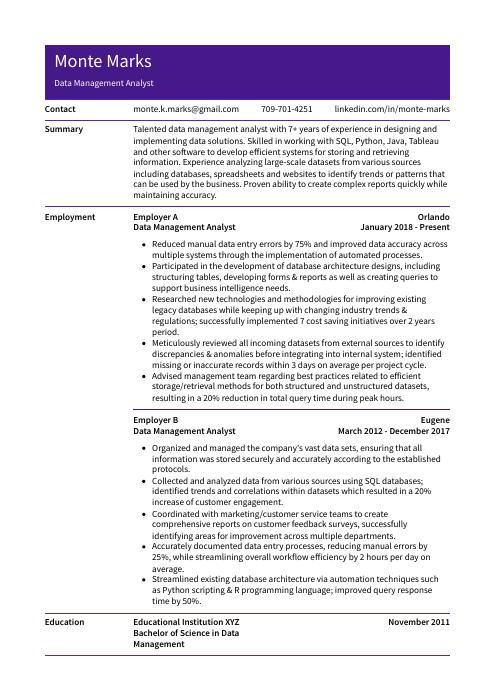 Pika
Pika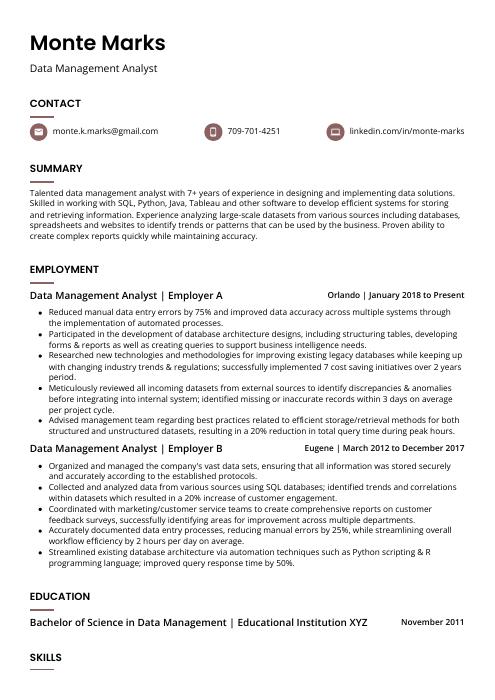 Fossa
Fossa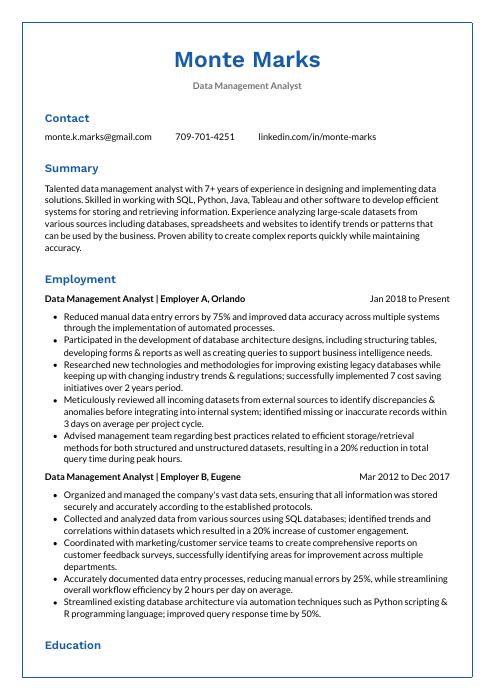 Markhor
Markhor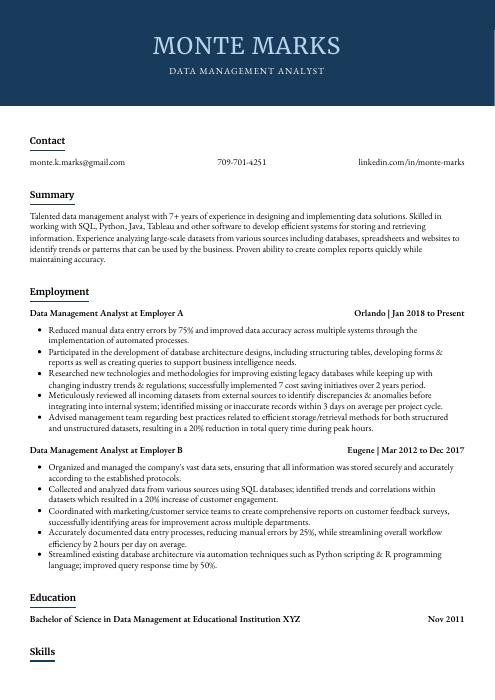 Bonobo
Bonobo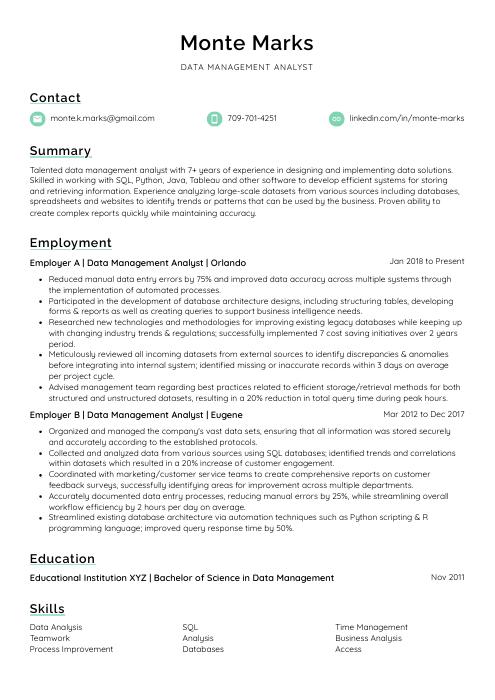 Lorikeet
Lorikeet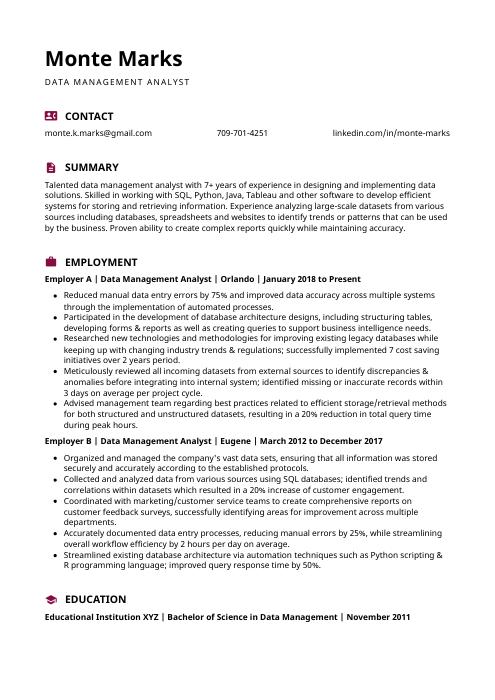 Hoopoe
Hoopoe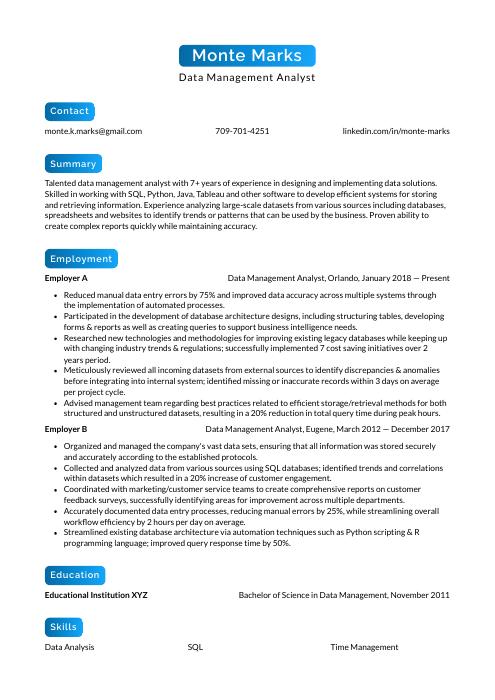 Kinkajou
Kinkajou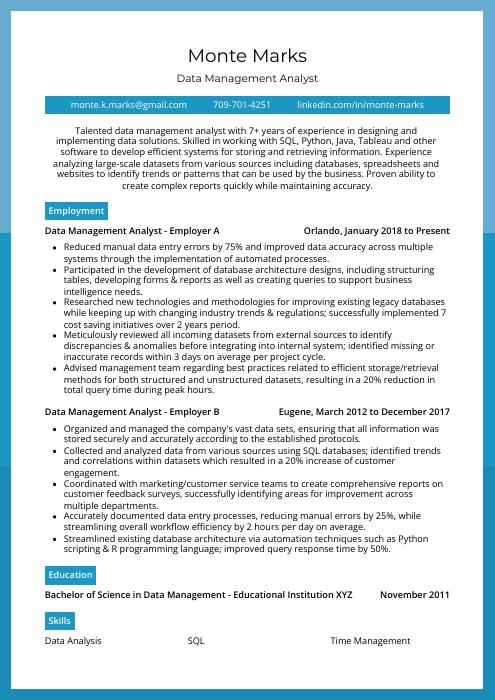 Rhea
Rhea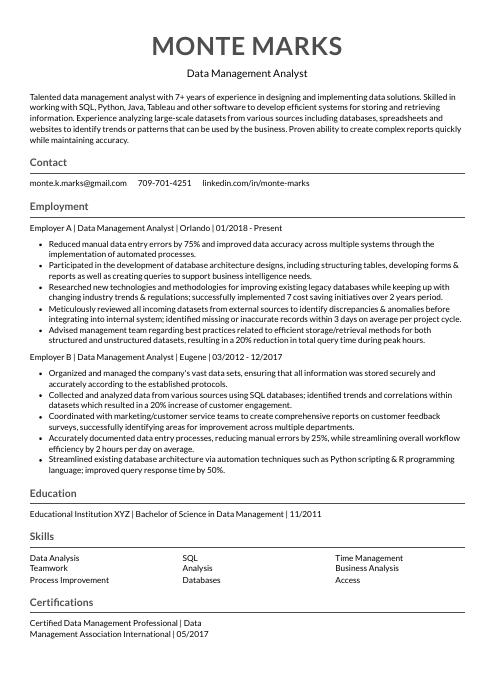 Indri
Indri Rezjumei
Rezjumei
